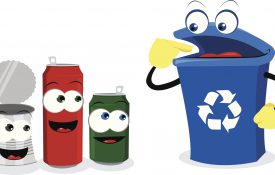-
Secret to helping brain age well? Painting and other mental challenges
The Boston Globe: I recently took a painting class with friends during which I learned that my lack of brush-stroke skills compounded my dearth of innate visual talents. Clearly, I’m the weakest link among my more artistic friends, which has made me hesitant to take more classes. But I’m rethinking my decision after hearing about a new study, which found that those who truly challenge themselves by learning novel skills get the biggest memory boost as they age. In other words, the instructors who painted such wonderful copies of a Van Gogh still-life likely weren’t working out their brains as hard as I was because painting—with all their practice and training—comes easy for them.
-
Why Are Kids Who Get Less Candy Happier On Halloween?
NPR: What makes trick-or-treaters happy is candy. And more candy is better, right? Well, it turns out that might not actually be the case. A few years ago researchers did on Halloween night where some trick-or-treaters were given a candy bar, and others were given the candy bar and a piece of bubble gum. Now, in any rational universe, you would imagine that the kids who got the candy bar and the bubble gum would be happier than the kids who got just the candy bar. George Wolford, a psychologist at Dartmouth College, and his fellow researchers, Amy Doe and Alexander Rupert, found something quite different.
-
Nalini Ambady, Psychologist of Intuition, Is Dead at 54
The New York Times: Nalini Ambady, a social psychologist whose research on the surprising accuracy of first impressions was popularized by Malcolm Gladwell in “Blink,” his best-selling nonfiction book of 2005, died on Oct. 28 in Boston. She was 54. Her death, from leukemia, was announced by Stanford University, where she had taught since 2011. In “Blink,” subtitled “The Power of Thinking Without Thinking,” Mr. Gladwell explored the psychology of intuition, snap judgments and gut reactions. The book prominently features Professor Ambady’s work, which centered on the cognitive processes underpinning intuition.
-
“Ce l’ho sulla punta della lingua”: è un primo segnale di demenza in arrivo? (“Tip-of-the-Tongue” moments a sign of aging?)
La Stampa: A tutti sarà capitato almeno una volta di avere “sulla punta della lingua” quel termine, quel nome… quella cosa insomma che, proprio adesso, non ci sovviene. Ma, a parte il disagio che questi episodi possono provocare, potrebbero essere un primo segnale che stiamo perdendo la memoria? Che possiamo essere vittime della temuta demenza? A cercare di comprendere se queste défaillance nella memoria sono normali o il segnale di qualcosa di patologico sottostante o in fase di insorgenza è uno studio condotto dai ricercatori dell’Università della Virginia pubblicato sulla rivista Psychological Science, una rivista della Association for Psychological Science (APS).
-
Living Through War Leads to In-Group Solidarity
War experiences have a long-term effect on human psychology, shifting people’s motivations toward greater equality for members of their own group, according to research forthcoming in Psychological Science, a journal of the Association for Psychological Science. According to study co-author Joseph Henrich of the University of British Columbia, “these effects have the potential to explain both why conflict sometimes leads to cycles of war and sometimes stimulates nation-building in its wake.” “Our research shows that exposure to war affects human psychology in specific ways,” says psychological scientist and economist Michal Bauer of Charles University in Prague, Czech Republic.
-

“Please Feed Me”: The Power of Putting a Human Face on Social Causes
Companies often put a personal face on products to connect with consumers. The same idea may also work for social causes, like recycling and energy conservation, according to a series of studies.

